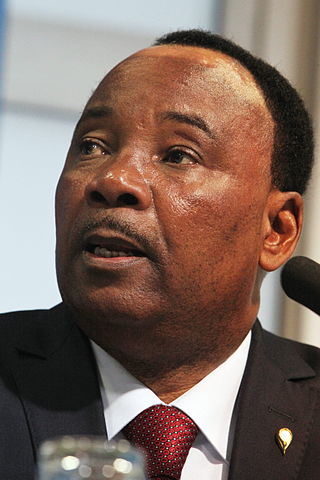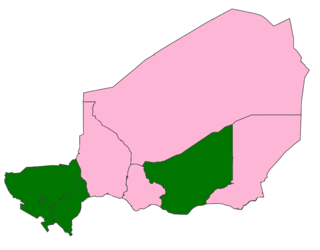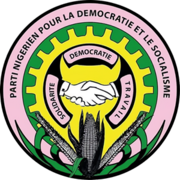
Politics of Niger takes place in a framework of a semi-presidential representative democratic republic, whereby the President of Niger is head of state and the Prime Minister of Niger head of government, and of a multi-party system. Executive power is exercised by the government. Legislative power is vested in both the government and the National Assembly.

Hama Amadou is a Nigerien politician who was Prime Minister of Niger from 1995 to 1996 and again from 2000 to 2007. He was also Secretary-General of the National Movement for the Development of Society (MNSD-Nassara) from 1991 to 2001 and President of the MNSD-Nassara from 2001 to 2009. Amadou is from the Kurtey, a Fula sub-group, and was raised in the Tillaberi Region, in the Niger River valley, north of Niamey.

Mamadou Tandja was a Nigerien politician who was President of Niger from 1999 to 2010. He was President of the National Movement for the Development of Society (MNSD) from 1991 to 1999 and unsuccessfully ran as the MNSD's presidential candidate in 1993 and 1996 before being elected to his first term in 1999. While serving as President of Niger, he was also Chairman of the Economic Community of West African States from 2005 to 2007.

Mahamane Ousmane is a Nigerien politician. Elected as the fourth President of Niger at 43 years old, he is the youngest elected president in Africa. He was also the first democratically elected president of his country, serving from 16 April 1993 until he was deposed in a military coup d'état on 27 January 1996. He has continued to run for president in each election since his ouster, and he was president of the National Assembly from December 1999 to May 2009. Since April 2020, he is the president of the Democratic and Republican Renewal, a major political party that is currently in opposition. RDR Tchanji formed an alliance with Ousmane's other political vehicle, MNRD Hankuri, on 16 December 2018.

Elections in Niger take place within the framework of a semi-presidential system. The President and National Assembly are elected by the public, with elections organised by the Independent National Electoral Commission (CENI).

Mahamadou Issoufou is a Nigerien politician who served as the president of Niger from 7 April 2011 to 2 April 2021. Issoufou was the prime minister of Niger from 1993 to 1994, president of the National Assembly from 1995 to 1996, and a candidate in each presidential election from 1993 to 2016. He led the Nigerien Party for Democracy and Socialism (PNDS-Tarayya), a social democratic party, from its foundation in 1990 until his election as president in 2011. During the presidency of Mamadou Tandja (1999–2010), Issoufou was the main opposition leader.

The National Movement for the Society of Development, also known as the National Movement for the Development of Society is a political party in Niger. Founded under the military government of the 1974–1990 period, it was the ruling party of Niger from 1989 to 1993 and again from 1999 until 2010, when a coup on 18 February 2010, by a military junta called the Supreme Council for the Restoration of Democracy (CSRD) ousted the president, Mamadou Tandja.

The Democratic and Social Convention - Rahama is a political party in Niger.

The Rally for Democracy and Progress is a political party in Niger, led by Hamid Algabid. It was established as the ruling party during the presidency of Ibrahim Baré Maïnassara.

The Nigerien Alliance for Democracy and Progress is a political party in Niger. Moumouni Adamou Djermakoye led the party from its foundation in 1992 until his death in 2009.

Mohamed Bazoum is a Nigerien politician who served as the 10th president of Niger from 2021 to 2023. He assumed office in April 2021 after winning the 2020–21 presidential election and surviving a coup d'état attempt. He was ousted in the 2023 Nigerien coup d'état by members of the presidential guard and the armed forces led by Abdourahamane Tchiani.
Moumouni Adamou Djermakoye was a Nigerien politician and the President of the Nigerien Alliance for Democracy and Progress. He was an important minister during the regime of Seyni Kountché and subsequently served as Niger's Ambassador to the United States from 1988 to 1991; later, after founding the ANDP, he served as President of the National Assembly of Niger from 1993 to 1994. He was the ANDP's candidate in four presidential elections, beginning in 1993; he was also a deputy in the National Assembly from 1999 to 2009 and the President of the High Court of Justice from 2005 to 2009.

General elections were held in Niger in 1999; the first-round of the presidential elections was held on 17 October, with a run-off held alongside National Assembly elections on 24 November. The elections followed a coup d'état on 9 April, in which Ibrahim Baré Maïnassara, who had led an earlier coup in January 1996 and won disputed presidential elections, was assassinated. Coup leader Daouda Mallam Wanké initiated a transitional period that concluded with the victory of Mamadou Tandja, the candidate of the National Movement for the Society of Development (MNSD), over Mahamadou Issoufou, the candidate of the Nigerien Party for Democracy and Socialism (PNDS), in the run-off. The vote for the first National Assembly of the Fifth Republic, which had originally been scheduled for October, but delayed in August, also saw a victory for the MNSD, which won 38 of the 83 seats. It formed a coalition with the Democratic and Social Convention in order to gain a majority in the Assembly.

Hassoumi Massaoudou is a Nigerien politician who served as minister of Foreign Affairs of Niger from 2021 to 2023. He served as minister of Finance from October 2016 to January 2019. A leading member of the Nigerien Party for Democracy and Socialism (PNDS-Tarayya), he was minister of Communication, Culture, Youth and Sports from 1993 to 1994, president of the PNDS Parliamentary Group from 1999 to 2004, director of the Cabinet of the President from 2011 to 2013, minister of the Interior from 2013 to 2016, and minister of National Defense in 2016.

The Alliance of the Forces of Change was one of the two large political coalitions which contested for power in Niger from 1991 to 1996.
Issoufou Assoumane is a Nigerien politician who has been President of the Union of Nigerien Democrats and Socialists since 2001. He served in the government of Niger as Minister of Mines and Energy from 1995 to 1996 and as Minister of the Environment from 2000 to 2001.

Parliamentary elections were held in Niger on 12 January 1995. The last elections of the Third Republic, they were called following a split in the ruling coalition, but resulted in a government divided between the party of the President and an opposition coalition with a majority in the National Assembly and the post of Prime Minister. The ensuing stalemate was a contributing factor to the coup that overthrew the regime on 27 January 1996.

General elections were held in Niger on 31 January 2011 to elect the President and National Assembly, with a second round of the presidential elections on 12 March. The first round of the presidential elections was originally scheduled to be held on 3 January and the second round on 31 January, but was later postponed. The elections followed a military coup in February 2010 that ousted President Mamadou Tandja.

General elections were held in Niger on 21 February 2016, with a presidential run-off held on 20 March. A total of 15 candidates ran for the presidency, with incumbent President Mahamadou Issoufou running for re-election for a second term. There were two main opposition candidates also vying for the top post, Seyni Oumarou of the National Movement for the Society of Development (MNSD), who lost to Issoufou in 2011, and Hama Amadou of MODEN/FA, who has been campaigning from prison since November 2015. Most of the opposition agreed to align for the second round to back the second-placed candidate against Issoufou.

General elections were held in Niger on 27 December 2020 to elect the President and National Assembly. With incumbent president Mahamadou Issoufou stepping down following his two terms constitutional limit, new presidential candidates competed for office. As no presidential candidate received a majority of the vote on the first round, a second round was held on 21 February 2021. The ruling Nigerien Party for Democracy and Socialism (PNDS) candidate Mohamed Bazoum was declared the winner, beating Mahamane Ousmane in the second round with 56% of the vote. In the National Assembly elections the PNDS won 79 of the 166 seats, falling just short of a majority.











